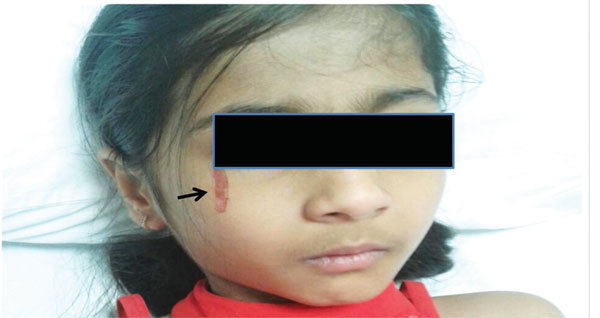Munchausen Syndrome (MS) is a psychiatric disorder characterized by
feigning of symptoms of some physical or mental disorder, by patients
[1].
A nine-year-old girl presented with complaints of
bleeding from multiple sites. Ten days prior to presentation, the child
had complained to her parents of severe pain in the right breast
followed by bloody discharge from right nipple. Similar bleeding was
also seen by the parents in other places, including eyes (Fig.
1), nose, ears, oral mucosa and umbilicus. The ‘bleeding’ consisted
of few drops and was self-limiting. Rest of the history was unremarkable
and there was no obvious psychological stressor. Her vital parameters
were stable and the systemic examination did not reveal any abnormal
findings.
 |
|
Fig. 1 Patient showing factitious bleeding from the
right eye.
|
Blood counts, including hemoglobin, platelet count
and peripheral smear were within normal ranges. Liver function tests and
coagulation profile were normal. Urine and stool microscopy did not
reveal any red blood cells or occult blood. Screening test for Factor
XIII levels was normal and platelet aggregation studies showed normal
aggregation with ADP, AA, Collagen and Ristocetin.
It was explained to the parents that there was a
discrepancy between their child’s clinical profile and her investigation
reports. In due course of time, the child revealed to the clinician and
the parents that she had been applying her mother’s liquid vermillion to
fake bleeding. Thus, she was diagnosed as a case of Munchausen Syndrome.
She was referred for psychiatric treatment, which the parents refused.
Munchausen Syndrome is an extreme form of factitious
disorders, wherein the sufferer simulates illness, to assume patient
role [1]. It is characterized by multiple outpatient visits or
hospitalizations [2]. Typically, sufferers lie deliberately and may
consume drugs like insulin, vitamins, warfarin to produce adverse
effects like hypoglycemia, and bleeding symptoms [3]. It is uncommon in
children and should be suspected if there is a discrepancy between
symptoms and signs/investigation results.
1. American Psychiatric Association. In:
Diagnostic and Statistical Manual of Mental Disorders, 4th ed.
Washington, DC: American Psychiatric Association; 1994:471-2.
2. Asher R. Munchausen’s
syndrome. Lancet. 1951;1:339-41.
3. Guggenheim FG. Somatoform disorders. In: Sadock BJ, Sadock
VA, editors. Kaplan and Sadock’s Comprehensive Textbook of Psychiatry.
7th ed. Philadelphia, PA: Lippincott, Williams and Wilkins;
2000:1514-8.

